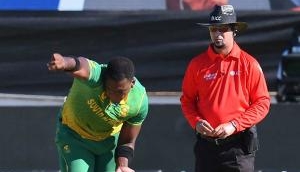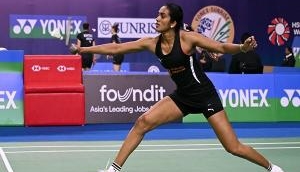Dutee Chand: "I'm finally free to run and remain a girl"

The ban
- In 2014, the Athletics Federation of India stopped Dutee Chand from competing as a female athlete
- This was due to the presence of naturally high levels of testosterone in her body
- The world body, IAAF, has rules preventing athletes with this condition from competing as female
The appeal
- Dutee challenged the ban in the Court of Arbitration for Sport
- She contended that she had a right to run, and couldn\'t be blamed for her condition
The ruling
- The CAS ruled \'partially\' in her favour, allowing her to compete again
- The court said it didn\'t find substantial proof that this condition gives the athlete an advantage
- It gave the IAAF two years to present proof if it didn\'t want the rule struck down
Dutee Chand was born a girl and intends to stay that way. She also intends to keep running for India and will be able to do so again.
The Lausanne-based Court of Arbitration for Sports (CAS) ruled that there's no substantial proof that a naturally high level of testosterone in a female athlete's body is enough to bar her from competing against other female athletes. It suspended the rule for two years, helping Dutee get back on track.
A champion in the making
The CAS ruling comes as a huge relief for the 19-year-old sprinter from Odisha, who was emerging as India's new big hope in athletics before the controversy hit her.
In 2012, Dutee became the national champion in the 100 metres event in the under-18 category. Then she won the bronze in the 200 metres event at the Asian Championships in Pune.
In 2013, she became the first Indian to reach the final of a world championship event when she reached the 100m final at the 2013 World Youth Championships.
What kept Dutee out
Dutee was stopped from competing in women's events by the Athletics Federation of India (AFI) a year ago.
This possibly prevented her from winning medals at the Commonwealth Games in Glasgow and the Asian Games in Incheon last year.
The AFI dropped Dutee from the CWG team at the last moment. The body tried to hide the reason why; a top AFI official anonymously told the Press Trust of India that she had "not touched the qualifying standard".
But the media discovered that Dutee had been ordered to take a gender test by the Sports Authority of India.
Due to her high level of testosterone, Dutee was barred from competing in women's events, but in August last year, Katrina Karkazis of the United States started a Change.org petition titled, "Let Dutee Run! Don't Ban Women Athletes for High Natural Testosterone." It had 5,647 supporters.
Dutee was stopped from competing in women's events by the AFI and the IAAF due to high levels of testosterone
The AFI and, later, the International Association of Athletics Federations (IAAF), found Dutee 'more male' than other female athletes due to her naturally high level of the male hormone testosterone. But she fought back and the case went all the way to the CAS in Lausanne, Switzerland.
The CAS then had to consider one of the most basic questions that any sports federation aiming for fairness can ask: how do you classify an athlete as a man or a woman?
Testosterone levels are usually a decisive factor, since men usually have higher testosterone levels than women. But what about hyperandrogenic women - that is, women with naturally high levels of testosterone?
The Semenya case and its fallout
Dutee's appeal to CAS against her ban was the second such appeal, after the one filed by South Africa's Caster Semenya in 2009.
In fact, Semenya's was the first case to bring hyperandrogenism to light. She ran the 13th fastest 800m time in 2009. Her performance, however, caused some controversy and the IAAF was "obliged to investigate".
Semenya underwent a gender test. A year later, she was cleared to participate, but her gender test results weren't released for privacy reasons.
In 2011, the IAAF came out with new rules to avoid a repeat of the Semenya affair.
"A female with hyperandrogenism, who is recognised as a female in law, will be eligible to compete in women's competition in athletics, provided that she has androgen levels below the male range (measured by reference to testosterone levels in serum) or, if she has androgen levels within the male range, she also has an androgen resistance, which means that she derives no competitive advantage from such levels," wrote The Guardian.
The rule required athletes to have testosterone levels below 10 nanomoles per litre, the lower end for the male range.
During the 2012 Summer Olympics, four female athletes between the ages of 18 to 21, all from rural areas of developing countries, were found to have high levels of testosterone. Subsequently, they each had surgeries to remove internal testes.
Court wants more proof
The court said in its interim ruling that the IAAF must come back and provide it with scientific evidence 'about the quantitative relationship between enhanced testosterone levels and improved athletic performance in hyperandrogenic athletes'.
"In the absence of such evidence, the CAS Panel was unable to conclude that hyperandrogenic female athletes may benefit from such a significant performance advantage that it is necessary to exclude them from competing in the female category," the court ruled.
However, it added: "Nevertheless, since there are separate categories of male and female competition, it is necessary for the IAAF to formulate a basis for the division of athletes into male and female categories for the benefit of the broad class of female athletes. The basis chosen should be necessary, reasonable and proportionate to the legitimate objective being pursued."
Fresh beginning
In a statement released by her lawyers, Dutee said: "I have a right to run and compete. But that right was taken away from me. I was humiliated for something that I can't be blamed for. I am glad that no other female athlete will have to face what I have faced, thanks to this verdict."
The CAS ruling comes as a massive boost for Dutee and other female athletes with similar issues. She can now resume her career and pursue her dream of an Olympic medal; if not next year, then at least at the 2020 Olympics.
First published: 29 July 2015, 6:41 IST






![BJP's Kapil Mishra recreates Shankar Mahadevan’s ‘Breathless’ song to highlight Delhi pollution [WATCH] BJP's Kapil Mishra recreates Shankar Mahadevan’s ‘Breathless’ song to highlight Delhi pollution [WATCH]](https://images.catchnews.com/upload/2022/11/03/kapil-mishra_240884_300x172.png)

![Anupam Kher shares pictures of his toned body on 67th birthday [MUST SEE] Anupam Kher shares pictures of his toned body on 67th birthday [MUST SEE]](https://images.catchnews.com/upload/2022/03/07/Anupam_kher_231145_300x172.jpg)






